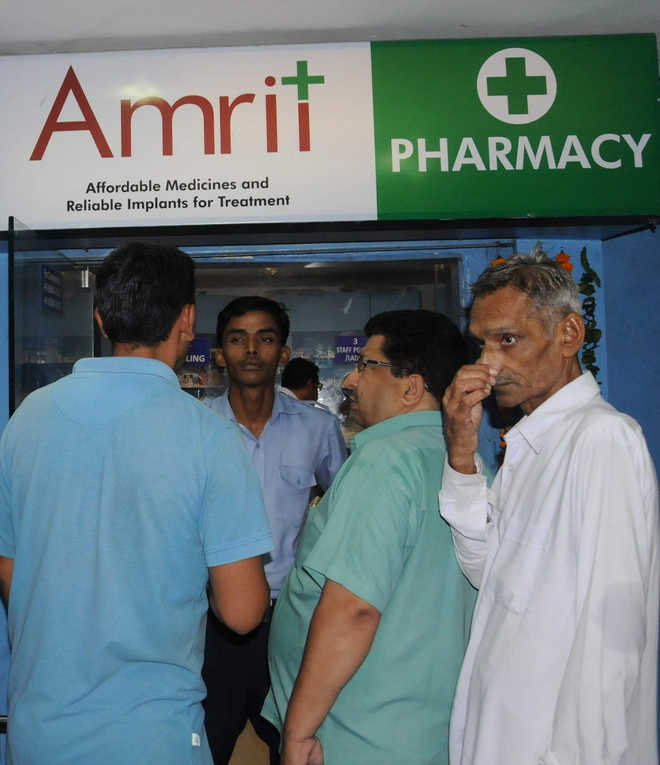Mohit Khanna
Tribune News Service
Chandigarh, December 31
Gurmail Singh, a farmer from Sangrur, spent nearly Rs 20,000 for buying hip-joint from a private chemist for the operation of his son Amrik Singh, who is undergoing treatment at the Postgraduate Institute of Medical Education and Research (PGIMER).
Gurmail Singh is not the only case. A majority of the people, whose kin are undergoing orthopaedic surgeries at the PGI, are not aware of the availability of implants at Amrit pharmacy.
It was in June when Union Health Secretary CK Mishra inaugurated the new facility of
providing orthopaedic implants to patients at significantly reduced rates at the Amrit pharmacy in Nehru Hospital.
However, the sale of orthopaedic implants at Amrit pharmacy has proved to be a non-starter.
Many factors led to a drop in the sale of orthopaedic implants, say experts at the PGI. Initially, the sale of implants was hampered due to the imposing of the Good and Service Tax (GST).
Lack of awareness was stated to be the major factor behind the decline in the sale of orthopaedic implants.
“People from various parts of northern states visit the PGI for treatment. A majority of the patients and their attendants visiting the PGI for operations do not have any clue about the availability of economical implants,” said a doctor requesting anonymity.
Touts of several chemists make a beeline outside the consulting room of orthopaedic surgeons and at trauma centres. The moment a patient comes out of the room, touts start giving presentations about the availability of implants.
“The best method to curb the menace is to make a detailed list of available implants at Amrit pharmacy and paste the list at trauma and other orthopaedic surgery wards. The quotation of rate should also be mentioned on the list,” said the doctor.
He said doctors should also be instructed to tell the patients about the availability to implants at Amrit pharmacy.
A medical expert said: “Amrit store does not directly deal with the sale of orthopaedic implants. Patients visit the pharmacy with doctor’s prescription and place an order for implant. Pharmacy employees will further place the order and the backend department of the pharmacy then arranges the medicine. The long process also drains the energy of attendants and they prefer to buy the implant from the Sector 11 market at a competitive price and assistant service.”
Sanjiv Roy, in-charge of Amrit pharmacy, said he had been transferred and Yoginder Sharma has taken the charge. Despite repeated attempts, Yoginder Sharma did not respond.
One of the employees working at Amrit said they record a sale of merely two or three implants in a week.
‘Several factors led to a drop in the sale of orthopaedic implants’
Many factors led to a drop in the sale of orthopaedic implants, say experts at the PGI. Initially, the sale of implants was hampered due to the imposing of the Good and Service Tax (GST). Lack of awareness was stated to be the major factor behind the decline in the sale of orthopaedic implants.
Unlock Exclusive Insights with The Tribune Premium
Take your experience further with Premium access.
Thought-provoking Opinions, Expert Analysis, In-depth Insights and other Member Only Benefits
Already a Member? Sign In Now










